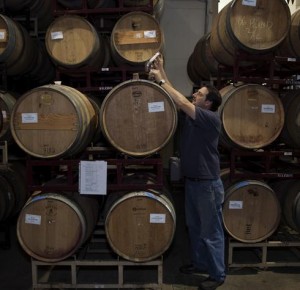
HONG KONG — As wine consumption skyrockets in the greater China region, Chinese businessmen are setting their sights on Napa.
In that wine-rich valley, a growing number of businessmen are looking at vineyards for sale, or commissioning bulk wine to bottle in China. Their goal: boost exports of U.S. wines to the booming China and Hong Kong markets.
While wine consumption is still low in China compared with developed markets such as the U.S., it's increasing dramatically. Over the past five years, China's consumption of U.S. wines has quadrupled, to 6.26 million liters in 2009, according to International Wine and Spirit Research, a U.K. consulting group.
The trend has captivated U.S. winemakers, which historically have relied less on exports than other nations because of high domestic demand. It's also generating substantial interest from Chinese investors.
"The growth has been spectacular," says David Henderson, founder of Montrose Food & Wine, a major importer of American and other foreign wine into China. "It's grown right along with the consumer in China."
Last month, a group of Chinese investors bought Napa Valley winery Silenus Vintners and an adjoining parcel of land for $6 million. It's the first major transaction of its kind in the region and likely the beginning of a trend, real estate agents and investment bankers say.
Chinese investors have long been keen to put money into natural resources and real estate projects. "Now, they invest their money in expensive wines," says Hua Ming, a Chinese-American with a minority stake in Silenus. His partner, a Chinese investor from Henan Province in China, owns a majority stake.
Foreign ownership of U.S. wineries isn't new. The French have deep roots in Napa Valley, and Australians have stakes in California wineries. But Chinese interest in Napa wineries is taking hold as trade ties between the U.S. and China deepen.
Interest is so strong that California real estate agent Steven Rea recently set up an agency, The Reserve Group, to serve Asian clients, especially those from China and Hong Kong.
"They have the money, and they're breaking all the records at the wine auctions," Rea says. "My feeling is that if you're spending half a million on wine bottles, wouldn't you love to own your own vineyard or winery?"
U.S. sales to China buck global trend
While U.S. wine exports slipped 9.5% overall to $912 million in 2009, exports to China and Hong Kong are increasing despite a stuttering global economy.
"China is a tremendous opportunity," says Linsey Gallagher, director of international marketing for the Wine Institute, an advocacy group for the California wine industry.
Besides selling bottles overseas, U.S. winemakers are producing bulk wines to be bottled in China by local producers. These bulk shipments are rising because some of China's vineyards are not mature enough to produce "first-class wines," says Charles Johnston, a Napa Valley winemaker who sits on the board of a Sino-American venture that ships wine to China.
While Chinese wines are steadily improving in quality, they have a long way to go. Up until a few years ago, the country's "producers saw wine as a beverage along with milk and Coca-Cola," says Debra Meiburg, a wine expert in Hong Kong.
Currently, California accounts for 90% of U.S. wine exports overseas, the Wine Institute estimates. But states such as Washington are working hard to boost their market share.
Ste. Michelle Wine Estates, headquartered in Woodinville, Wash., was one of the first U.S. winemakers exporting to China 15 years ago.
At that time, China was a nation of bikes rather than cars, and Al Portney, the company's vice president of international sales, recalls thinking: "How do you sell wine to people on bicycles? First, it's difficult to carry. Second, it's difficult to consume it and then get back on your bicycle."
Yet, as China's economy developed, income levels rose and cars increasingly replaced bikes, solving this logistical problem. The country's wine industry also got a boost as the government encouraged Chinese to drink alcohol made from grapes rather than grain so the latter could be used for food production.
'A leg up' on business
China's rising wine demand has led Henderson to expand beyond importing wines.
For the past few years, he's made wines including chardonnay, riesling and merlot at a vineyard in northwest China, then sold it in the U.S. and Europe. He plans to begin selling the Chinese-made wine, under the label Dragon's Hollow, in China and Hong Kong next year.
Hua and his partner want to start their own vineyard in China.
They're negotiating with the government for land near their hometown of Zhengzhou — virgin wine territory in eastern China — where they can produce quality wines for the country's developing palate. Yet for now, their biggest challenge lies thousands of miles away, nestled in Napa Valley's rolling hills.
The Silenus winery started out as a walnut farm. In 1967, the Newlan family cut down the walnut trees and planted cabernet sauvignon and pinot noir grapes, eventually selling the grapes to well-known brands such as Robert Mondavi and Inglenook. During the '80s and '90s, the family produced wine under its own label. But the property's real success over the years came from making high-quality wine for boutique producers.
Skeptics worry that Chinese investment in Napa Valley could change the character of the region — and the quality of its wines. But supporters say it'll enhance ties between the two countries and unlock new opportunities for U.S. winemakers.
"Entering a new market is very difficult for Western wineries to do," says Scott Meadows, general manager of Silenus Vintners. "But having a Chinese partner that has the ability and knowledge hopefully gives you a leg up."
Contributing: Steve LaBadessaphotog and Michelle Yun













